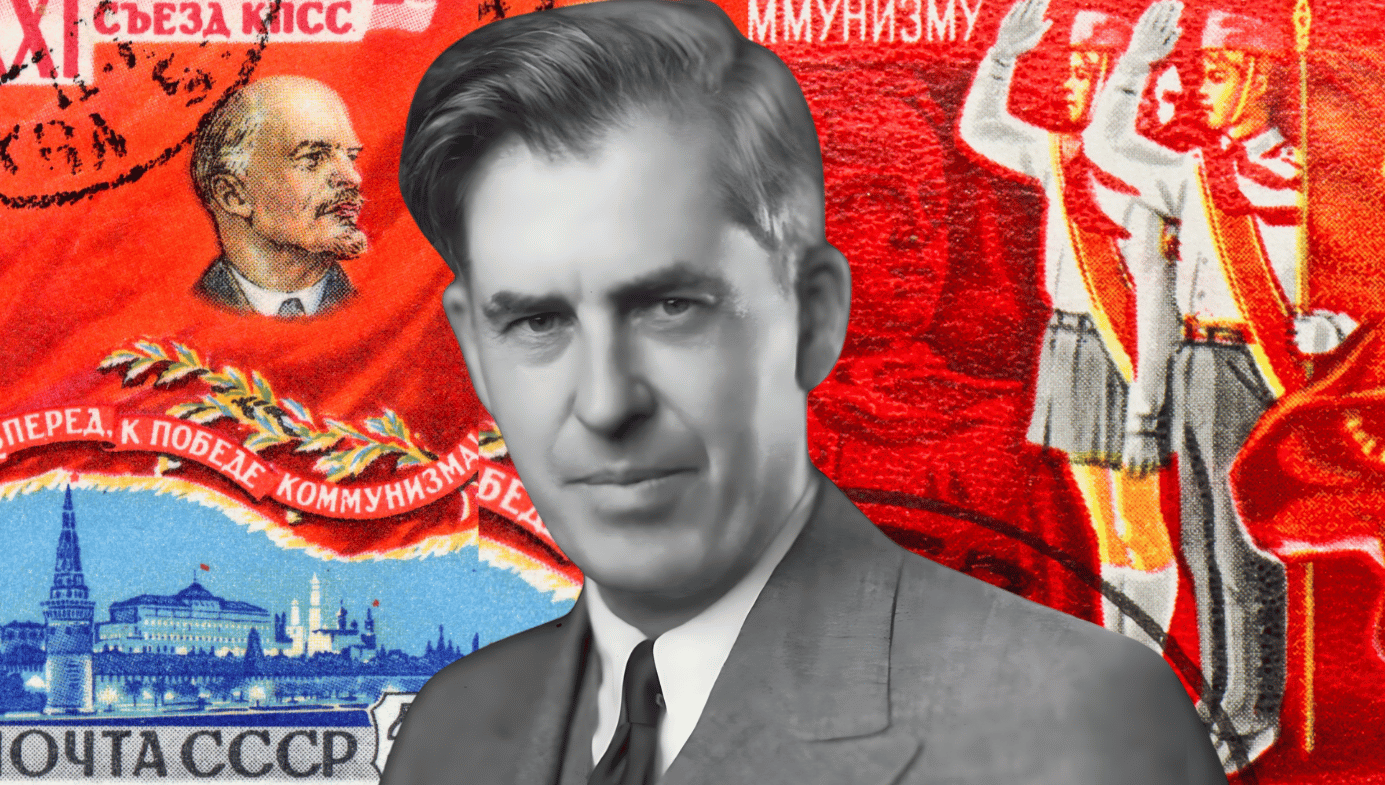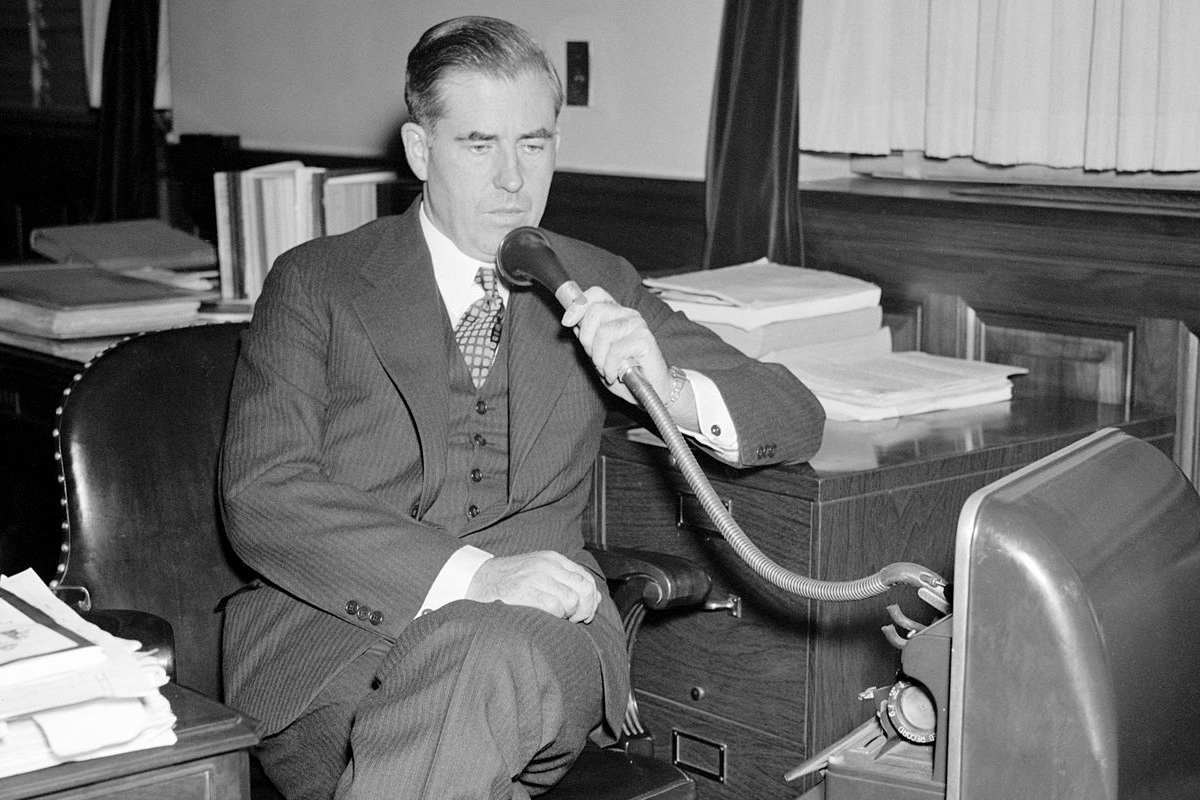Politics
Misadventures of a Stalinist Stooge
Benn Steil’s engrossing new biography of Henry A. Wallace is a timely cautionary tale and a masterpiece of 20th-century American history.

A review of The World That Wasn’t: Henry Wallace and the Fate of the American Century by Benn Steil; 687 pages; New York: Avid Reader Press (January 2024)
I. Henry A. Wallace and His Apologists
Benn Steil is a senior fellow at the Council of Foreign Relations and the prize-winning author of The Marshall Plan: Dawn of the Cold War and The Battle of Bretton Woods. These two books have justly established Steil as a major diplomatic historian, who has shed new light on important episodes in our recent past. Now, Steil has turned his attention to the life and career of Henry A. Wallace, whom FDR appointed as his secretary of agriculture in his first Cabinet. In 1940, Roosevelt made Wallace his vice-presidential candidate for a critical wartime election. In 1944, he succumbed to pressure from major Democrats to bounce Wallace from the ticket, and chose Senator Harry S. Truman to be the vice-presidential candidate instead. Wallace was given the consolation prize of secretary of commerce, a post he held until Truman—who became president after Roosevelt’s sudden death in office—fired him in September 1946.
I have been thinking and writing about Wallace’s life and career for many years, since I made him the subject of my MA thesis as a young graduate student. While working on that project, I got to spend an entire day in 1959 with Wallace at his farm in South Salem, New York, where he responded to my many questions. He also gave me exclusive access to—and use of—his private diary, which had not yet been published. I found Wallace to be cooperative, pleasant, friendly, and an easy conversationalist. As his 1948 campaign song had it, he appeared to be “Friendly Henry Wallace.” He picked me up at the train station in his Volkswagen Beetle, which was not the kind of car I expected the former vice president and millionaire to be driving. And when I departed after dinner, he insisted on giving me a carton of eggs that his chickens had laid.
Wallace’s father had been secretary of agriculture in the Warren G. Harding and Calvin Coolidge cabinets in the 1920s, and his grandfather was the founder of the most well-known agricultural journal, Wallace’s Farmer. Henry Wallace may have been the most influential of the lineage; he discovered the process of making hybrid corn, which led to an agricultural revolution. As a result, Mexico tripled its corn production and saw a five-fold increase in wheat production. But what has drawn historians’ attention was not Wallace’s expertise as an agricultural pioneer. It was his support and defense of the totalitarian Soviet Union and his admiration for Joseph Stalin.
With the onset of the Cold War at the end of World War II, Wallace prominently argued that Stalin was not interested in spreading communism and expanding a Soviet empire. Soviet policy, he insisted, was to continue the wartime American–Soviet alliance in pursuit of a peaceful postwar world. Perversely, Wallace’s Soviet sympathies have made him a hero to contrarian documentarians, intellectuals, writers, journalists, and political figures today. Among them is Glenn Greenwald, who wrote an essay for the Intercept in 2019 in which he claimed that Wallace was persecuted on account of his “pro-peace” beliefs. (I replied to Greenwald in these pages at the time.)

The previous year, Peter Beinart had published an essay in the Atlantic arguing that Bernie Sanders, the socialist senator from Vermont, was “reviving Henry Wallace’s vision for global democracy.” Wallace, Beinart wrote, “saw unchecked private wealth as a threat to liberty” and believed that Nazism was “the result of a toxic alliance between demagogues and big business.” Beinart seemed to agree with Wallace that America’s “hard line against the USSR” was unnecessary, and that in our own time, America’s leaders—be they Democrats or Republicans—want the US to dominate and uplift the world at the same time. Beinart sought a policy based not on the myth of American exceptionalism, but on the “empowerment” of what Wallace called “the common man.”
But no one has shown greater dedication to defending Wallace than filmmaker Oliver Stone and his historian colleague Peter Kuznick. These two men believe that the Cold War would have been avoided entirely had Wallace’s policies been adopted, and they produced a ten-part documentary series for the Showtime network that praised Wallace as a man devoted to peace and cooperation with the Soviet Union. The book that accompanied the film led the late historian Martin Sherwin (co-author of the Oppenheimer biography on which Christopher Nolan’s Academy Award-winning biopic was based) to write that Stone-Kuznick had given us “the most important historical narrative of this century.” (In an essay for the Weekly Standard, I explained why Sherwin’s blurb was outrageous and completely wrong.)
In the New York Times Magazine, Andrew Goldman wrote that in Stone’s view, “Stalin, compared with Truman, still comes off as heroic, as an honest negotiator who, following F.D.R.’s death, was faced at every turn with Truman’s diplomatic perfidy.” Wallace, on the other hand, is depicted as “the biggest hero of all” and “treated to reverent orchestral music when his face appears on-screen, intercut at times with clips from ‘Mr. Smith Goes to Washington.’” Wallace, Stone tells viewers in the film’s narration, “stuck out like a sore thumb on Capitol Hill. He studied Buddhism and Zoroastrianism... He liked to spend evenings reading or throwing boomerangs on the Potomac.” Had he been President, we learn, “there would have been no Cold War at all.”
In Goldman’s article, the liberal Princeton historian Sean Wilentz remarks that Stone’s documentary “is basically a very standard left-wing, C.P., fellow traveler, Wallace-ite vision of what happened in 1945–46.” Wilentz is right. Toward the end of his documentary’s fourth episode, Stone waxes ecstatic over what might have been had Henry Wallace’s third-party bid for the presidency in 1948 succeeded. According to Stone, not only would the Cold War likely have been halted, but America might also have fulfilled FDR’s dream of a second Bill of Rights guaranteeing freedom from want for all.
Benn Steil’s new biography makes it abundantly clear that Stone’s utopian counterfactual is simply a fantasy. Steil calls the Progressive Party that Wallace led in 1948 “Gideon’s Red Army,” since it was created and led by members of the American Communist Party. When confronted with the truth about communist domination of his movement, Wallace simply replied: “Anyone who will work for peace is okay with me.” I would only add to Steil’s admonition that had Wallace become America’s president, Stalin would likely have achieved his goal of domination and control of Western as well as Eastern Europe, and would eventually have posed a military threat to the United States. After all, Wallace believed that only his own country threatened world peace and that there were “more warmongers concentrated in the USA than in any other nation of the world.”
Steil’s book is an important corrective because, in recent decades, scores of hagiographic books have celebrated Wallace’s life and politics. These books include Richard J. Walton’s Henry Wallace, Harry Truman and the Cold War; communist historian Norman D. Markowitz’s The Rise and Fall of the People’s Century: Henry A. Wallace and American Liberalism, 1941–1948; a biography by Edward and Frederick Schapsmeier titled Prophet in Politics: Henry A. Wallace and the War Years; Allen Yarnell’s Democrats and Progressives: The 1948 Presidential Election as a Test of Postwar Liberalism; and John C. Culver and John Hyde’s American Dreamer: A Life of Henry A. Wallace.
The last of these was the only other comprehensive biography, and the authors acknowledged that they resented what they called the “vilification of Wallace and his followers.” They exonerate Wallace of Soviet sympathies and mock anticommunist liberals of the day who claimed that Wallace’s so-called fight for peace was “further proof of a candidacy [for president in 1948] hatched in the Kremlin or a candidate held prisoner by a leftist ‘palace guard.’” Were the two authors writing their biography of Wallace today, they would not be able to get away with such blatant falsehoods.
Finally, in 2020, Nation magazine editor John Nichols published The Fight for the Soul of the Democratic Party: The Enduring Legacy of Henry A. Wallace’s Anti-Fascist, Anti-Racist Politics. Needless to say, the book received glowing blurbs from Noam Chomsky, Alexandria Ocasio-Cortez, Bernie Sanders, and Ilhan Omar. “Wallace,” Noam Chomsky informs us,“was right about a lot of things.” Benn Steil’s book reminds us that he was not.






